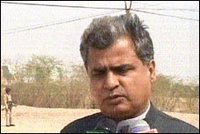Pakistan's Costly 'Other War'
By Selig S. Harrison- Washington Post -Wednesday,February 15, 2006; A21
The usual explanation for Pakistan's failure to go all-out against al Qaeda and Taliban forces along the Afghan frontier is that Gen. Pervez Musharraf's armed forces and intelligence services are riddled with Islamic extremists. But there is also another, equally disturbing, reason. Musharraf has increasingly been forced to divert ground forces and U.S.-supplied air power from the Afghan front and from Kashmir earthquake relief efforts to combat a bitter, little-noticed insurgency in his strategic southern coastal province of Baluchistan.
Musharraf's "other war" against the Baluch, an ethnic minority of 4.5 million, has become increasingly bloody in recent weeks. According to U.S. intelligence sources, six Pakistani army brigades, plus paramilitary forces totaling some 25,000 men, are battling Baluch Liberation Army guerrillas in the Kohlu mountains and surrounding areas. The independent Pakistan Human Rights Commission has reported "indiscriminate bombing and strafing" by 20 U.S.-supplied Cobra helicopter gunships and four squadrons of fighter planes, including U.S.-supplied F-16 fighter jets, resulting in 215 civilian dead and hundreds more wounded, many of them women and children.
Visiting U.S. Undersecretary of State Nicholas Burns told human rights commission leaders recently that the Baluch conflict is an "internal matter" for Pakistan to resolve and that the United States has not raised the issue with Musharraf. This policy should be reversed, not only to stop the carnage but also because the United States has a major strategic stake in a peaceful accommodation between Islamabad and Baluch leaders. The administration should call on Musharraf to start negotiations immediately, and President Bush should keep up the pressure when he visits Islamabad in March.
Multiethnic Pakistan, dominated by the Punjabis, who control the army, is likely to become increasingly ungovernable in the absence of a political settlement with the Baluch. A continued military confrontation in Baluchistan could well intensify long-festering ethnic unrest in neighboring Sind and embolden various anti-Musharraf forces throughout Pakistan. Musharraf's ability to put adequate military resources into the fight against al Qaeda and the Taliban, already limited, would be further reduced, undermining U.S. efforts to stabilize Afghanistan.
The strategic importance of Baluchistan has grown since China started building a port for Pakistan at the Baluch port of Gwadar, close to the Strait of Hormuz, with a projected 27 berths, enough for a major Pakistani naval base that could be used by Beijing. The Baluch ancestral homeland stretches west beyond Gwadar into adjacent Baluch-majority areas of eastern Iran, where there is a nascent Baluch rebellion against President Mahmoud Ahmadinejad.
Iran fears Baluch nationalism, but India is more ambivalent. New Delhi wants a stable Pakistan that will negotiate a peace settlement on Kashmir. At the same time, many Indian commentators appear happy to see Musharraf bogged down in Baluchistan and hope that the Baluch crisis will force him to ratchet down Pakistani support for Kashmiri Islamic extremist insurgents.
Musharraf has presented no evidence to back up his accusations that India is aiding the Baluch insurgents. But New Delhi did say on Dec. 27 that it is "watching with concern the spiraling military violence in Baluchistan" and called for political dialogue. Both Baluch and Sindhi leaders have often said that they would welcome Indian intervention to liberate them from Islamabad.
At present, most Baluch leaders do not call for independence. They are ready to settle for the provincial autonomy envisaged in the 1973 Pakistani constitution, which successive military regimes, including the present one, have nullified. What the Baluch, Sindhis and a third, more assimilated ethnic minority, the Pushtuns, want above all is an end to blatant economic discrimination by the dominant Punjabis. Most of Pakistan's natural resources are in Baluchistan, including natural gas, uranium, copper and potentially rich oil reserves, both onshore and offshore. Although 36 percent of the gas produced in Pakistan comes from the province, Baluchistan consumes only a fraction of its production because it is the most impoverished area of Pakistan. For decades, Punjabi-dominated central governments have denied Baluchistan a fair share of development funds and paid only 12 percent of the royalties due to the province for the gas produced there.
The Baluch were forcibly incorporated into Pakistan when it was created in 1947 and have subsequently staged two short-lived rebellions, in 1958 and 1962, as well as a protracted struggle from 1973 to 1977 that involved some 80,000 Pakistani troops and 55,000 Baluch tribesmen.
The big difference between earlier phases of the Baluch struggle and the present one is that Islamabad is no longer able to play off feuding tribes against each other and faces a unified nationalist movement. Another important difference is that the Baluch have a better-armed, more disciplined fighting force. Baluch leaders say that rich compatriots in the Persian Gulf are providing the money needed to buy weapons in the flourishing black market.
It is clear that a continuing Baluch insurgency would pose a major threat to the Musharraf regime and to U.S. interests in Pakistan. Future military and economic aid to Islamabad should clearly be withheld until Musharraf stops his military repression in Baluchistan and enters into serious negotiations with Baluch leaders. Once the present crisis is defused, the United States should launch a sustained effort to promote a process of democratization in Pakistan that gives long-overdue recognition to its multiethnic character.
The writer, former South Asia bureau chief of The Post, is the author of "In Afghanistan's Shadow," a study of Baluch nationalism. He is director of the Asia Program at the Center for International Policy.
© 2006 The Washington Post Company
____________________________________________________
Pakistan
Balochistan
















